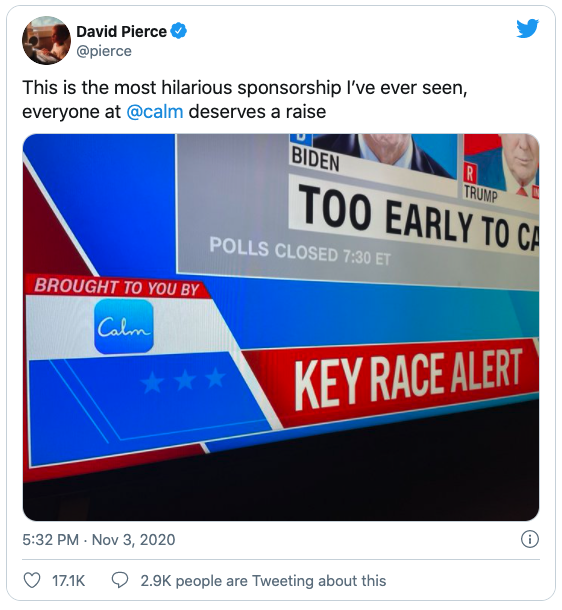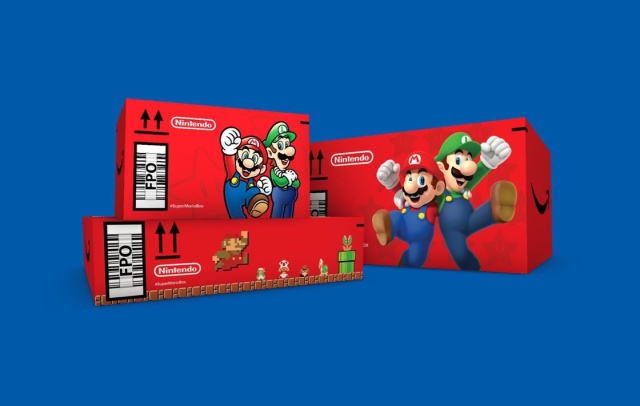| | Sent to over 20,000 digital marketers and entrepreneurs using ActiveCampaign. |
|
| | | Today: two terms for time's tricks on your memory, Fast Company's shared moment of clarity, and how the road to Toadstool Castle is paved with good intentions.
But first...
|
|
| | | | | In case you're unaware, Calm is a popular meditation app.
Our hats are off to them — because (A) their service will actually, y'know, serve a lot of people well these days and (B) holy crap isn't that genius ad placement? 😲
|
|
| | | | | a Buzzworthy Birthday, Part 2 |
|
| Plus: Top 5 Most Popular BuzzFeed Quizzes! |
|
| Yesterday, we began our commemoration of BuzzFeed's 14th birthday (this past Sunday) with four content lessons taught by the reigning listicle king.
Today, we've got four more of BuzzFeed's content lessons—and just because we all need something fun today, we've included BuzzFeed's all-time Top Five quizzes for dessert at the end of this piece. 🍰
5️⃣ We're busy and time-deprived and bored
BuzzFeed is really good at taking the latest stories and publishing content at lightning-fast speed, in a more digestible format so that its audience gets the most recent information first. That's gratifying for those who claim not to have time to read long-form articles. But they also gift us with a welter of sensational, distracting content that hits on positive emotions like a sense of fun, curiosity, and excitement. Can you create positive feelings of relatability around your content that keep your audience coming back?
6️⃣ Know your audience
BuzzFeed studies its audience through data and delivers what they want, not what they think their audience wants. Study your target audience, your competitors' behaviors, and ask questions. Producing relevant conversations around your brand that ultimately cinch sales is easier when you know what to talk about.
7️⃣ Curate, change, and create
In the beginning, BuzzFeed employed no writers or editors, just an "algorithm to cull stories from around the web that were showing stirrings of virality." Early on, the site launched an instant messaging client, BuzzBot, which sent users a link to popular content. Later, the site began spotlighting the most popular links that BuzzBot had found. Peretti hired curators to help describe and present the content that was popular around the web. BuzzFeed used that momentum to slingshot themselves into the space of the traditional news outlet they'd aimed to be, evolving with their customers' needs without losing sight of their brand's core.
8️⃣ Weird works
If you've ever looked at the content on BuzzFeed—like, really looked—you'll notice that it's odd. Written in Gen-Z speak and bedecked with bright-yellow buttons reading lol, wtf, and omg, it's a stream-of-consciousness-style quirk. But that's exactly why it works. So stop shrouding your ideas in layers of intellect and correctness. Scrub the boredom off of them, embrace the weird left-of-field position you can take, and people will notice it more than any vanilla version of... whatever it is you wanted to say.
|
|
| | | | | | | | | Thinking is hard today. Let's pick one thing and keep it colorful...
AMAZON's HALF-BAKED MARIO BOX: Excitement was our first reaction to this Engadget article because (as former Nintendo kids) the thought of getting an Amazon order in a colorful Mario-themed box (shown below) brightens our day a little bit. But then we actually read the article and we can only conclude that somebody didn't think this one through. Let's review why not:
1️⃣ They're limited-edition boxes (rightly, because that much color ink isn't cheap OR ideal for the environment) and yet this limited run of boxes isn't being used strategically, or really even purposefully. In fact...
2️⃣ They're using them at random to fulfill orders... whose contents might have absolutely nothing to do with Mario, Nintendo, or gaming. In other words, the added value will be 100% wasted on a large percentage of the people who receive their orders in these boxes. Moreover...
3️⃣ These boxes practically invite petty larceny. Not only are these boxes way easier than normal boxes to spot, but they also heavily imply that there are valuable Nintendo contents inside (like a Switch console, perhaps). Even for people who know (or find out) that this isn't the case, put the words 'Nintendo' and 'Limited Edition' in the same sentence and you'll have dorks swarming the hills for a collector's item. Yes, even an Amazon box.
|
|
| | | | | | | How To Avoid Bad Decisions, Vol. 6: Leveling and Sharpening |
|
| "How To Avoid Bad Decisions" is an ongoing series about cognitive biases, or the ways that we can misinterpret information without realizing it. This week's Volume 6 covers Errors of Memory, or the ways in which our recollection and reproduction of information can be inconsistent with the facts.
Click the links below to read previous volumes.
|
|
| Everyone knows the game of Telephone: tell a story to someone, then let them recount it (as best they can) to the next person in line, and on and on. The longer the line of people in sequence, the shorter (and stranger) the final recounting of the story will sound when compared to the original story.
Now consider an interesting variant: what happens to a story when you play Telephone all by yourself, over and over again?
Well, that's one way of describing memory: it's all the stuff your brain repeats to itself over and over again. Still, to answer the question, one-player games of Telephone tend to see the same degradations of the story—just maybe not as quickly. Either way, certain parts of the story will fall away while others will tend to grow in their significance. (Take a second to think about the stories you, or perhaps your partner, have told the most over time.)
Today's vocab words describe two ways that our memories can shift naturally over time. If we're being strict, these are not cognitive biases (distortions in one's thoughts) so much as normal functions of human memory. Still, to the extent these functions gradually separate our recollections from the true stories, it's worth stopping long enough to name them:
Leveling is when you omit details in the interest of simplifying or shortening your story. We know our true friends by their willingness to listen to the unabridged versions of our stories—or better yet, to participate in them. But we also know that crowhop-before-the-sprint feeling of our brains condensing an hour-long story to the length of an elevator pitch, like for networking events and cocktail parties (back when those happened).
Alternately: try to remember the last time you were required to repeat a story an aggravating number of times, and think of how you eventually landed on your stock, standard, one-sentence version. That's leveling taken to its logical (and at the time, very necessary) extreme.
Sharpening is when you magnify certain details beyond their original proportions. Exaggeration is the more obvious version of this, like how the bear gains 100 pounds every time Dad tells that story from camping in '84.
All of us have been guilty of that "inflation" at some point, but there are other forms of sharpening which aren't as obvious. There will be situations where specific details become more meaningful in hindsight, and maybe not until the story's been told a dozen times already.
There will also be situations where the "sharpened" details weren't actually present in the original; they were added in a later version of the story. This can be a dirty trick wherever it's intentional—but fortunately, it's innocent and accidental most of the time, simply because our brains try to fill gaps even (perhaps especially) when we're not looking. |
|
| I'LL TAKE 'You Can Anti-Trust Me' FOR $400, ALEX
|
|
| | | Jeopardy Clue: This term describes secret cooperation between rival companies for the sake of a shared interest. |
|
| Answer... errm... question at the bottom of this email. |
|
| | | | | Challenge accepted, Fast Company. |
|
| We got a chortle from this Fast Company headline, and we wondered how many little moments of self-awareness it caused across the country: |
|
| | | But then we thought to ourselves: joke's on you, because we work newspaper hours. You don't know hoo (hoo) the real night owls are, Fast Company. 🦉
Two more helpful bonuses from Fast Company:
Remember to breathe, everybody. This too shall pass. 🙂
|
|
| We're more than just a newsletter.
Feast your 👀 on our digital marketing workshops!
- Lead Generation Mastery: Predictably build an email list of qualified prospects for B2B or B2C sales [Registration Fee: $295]
- Email Newsletter Mastery: How to Plan, Launch, and Virally Grow an Email Newsletter that Nurtures Leads and Drives Sales [Registration Fee: $295]
- How to Build an SEO Magnet: A 12-Step process for creating content that attracts free traffic, leads, and conversions from search engines. [Registration Fee: $295]
|
|
|
| 'JEOPARDY' QUESTION: What is collusion?
To be clear, collusion (like a conspiracy) isn't usually illegal in and of itself. But it's certainly a common symptom of shady stuff. Where there's smoke, there's usually fire.
Collusion is most typical in market oligopolies, where a handful of big players control everything. And yes, those big players are competitors—but they all realize that it's in their shared interests to work together on certain things.
For example: big companies could collude to keep wages low, simply by agreeing to a (secret) wage cap and then refusing to budge whenever employees (or their unions) demand higher pay. This effectively strips the workers in that market of their bargaining power, which allows all of the big players to continue pocketing wider margins.
Big players could also collude against one another. If (for instance) there are only four players in a given market, two of them could secretly combine forces to wipe out one or both of the other players. But that makes for an unstable market, to say the least, and therein lies the rub.
|
|
| ADVERTISE // LICENSE OUR CONTENT // SUBSCRIBE
Copyright ©2020 Modern Publisher, LLC. All rights reserved.
538 S. Main St. Columbia, IL 62236
Love today's issue of theCLIKK? Hate it? Reply to this email and let us know. We're listening.
Some links are affiliate links. This means that if you sign up or buy something we might make a commission. That said, we only link to things we believe are beneficial to you, the reader. Pinky promise.
Issues? Email support@theclikk.com |
|
|
|
|







No comments:
Post a Comment